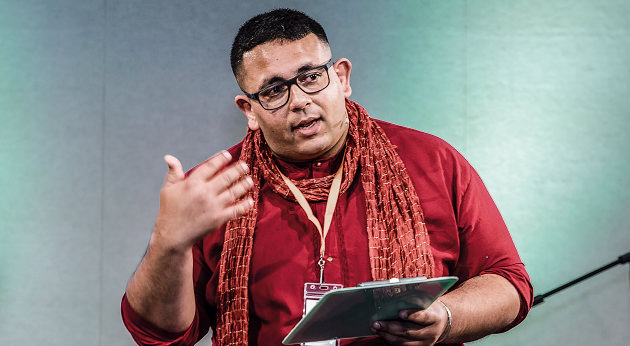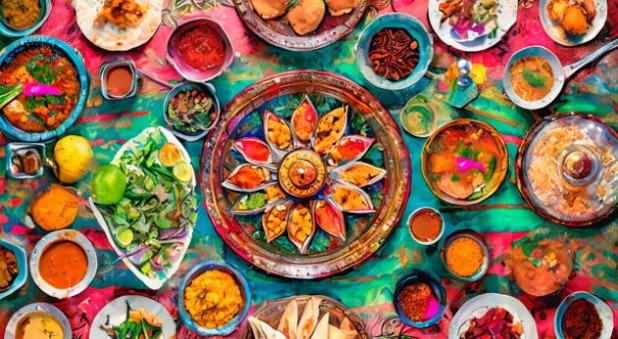Every uncle or aunty I know who makes genuinely stand-out curries never writes down recipes with exact measurements. And so, no masala (mix of spices) is exactly the same.
Just as every homemade curry has a unique masala, so with South Asian ministry, there is no formula that definitely works for every person. Each is a blend of language, culture, upbringing and values. And so, in our thinking about engaging our South Asian friends, neighbours and work colleagues, we need a holistic approach of genuine, messy discipleship.
Let me explain a little.
Many spices in a masala
Sydney is teeming with people who are broadly classified as South Asian. All the statistics are showing South Asians permeating every suburb in Sydney, let alone every major CBD in Australia. What's more, government trade agreements mean there are only more South Asians on their way! So how do we understand South Asians, let alone speak to them about Jesus?
South Asian peoples hail from India, Nepal, Pakistan, Sri Lanka, Bangladesh, Bhutan and the Maldives. Conservative estimates are that these countries include 650 languages, not including dialects. These languages aren’t just a means of communication, but function as each people group’s heart language, which they use to engage in their most significant life events. So, even if most skilled migrants from South Asia are highly proficient in English, first-generation peoples will likely default to their heart language for religion, traditions, family etc.
Languages and dialects also give an indication of people groups. Taking India as an example, most first-generation Indian migrants identify with their own people (think region) – Gujarati, Punjabi, Tamilian, Malayalee, etc. The only time Indians identify with India is when there’s a significant national event (like Independence Day), or because the Indian cricket team is touring!
Along with languages, people groups and cultures, South Asia is home to a plethora of belief systems: Hinduism, Jainism, Buddhism, Sikhism, Islam, Christianity, Baha’ism, and Zoroastrianism – not including the numerous sects within these religious beliefs.
Thus, each culture and subculture have a different value system and, within that, each individual or family’s modus operandi changes as they adopt bits and pieces from their context and experience. Many factors are at play, and so the how of our gospel communication needs to adapt. I don’t think we can assume that our South Asian friends are necessarily hearing the same thing we are proclaiming.
Masalas take time to perfect
So what do we do? We focus on everyday things. We show and tell. That is, spending time and energy investing in relationships will mean that you understand the background of the people you are speaking with – their hopes, dreams, struggles, and even previous experiences of religion.
By hearing the story of an individual, you are then in the best position to consider bridges to cross cultural barriers and apply the gospel to the particularities of each individual person. Remember, no masala is exactly the same.
No matter how you go about building relationships, do it while sharing of yourself and being willing to accept the hospitality of others. For many South Asians, an element of reciprocity is significant to honouring each other and building deep relationships.
 Above: Ben George pictured at last years SATYA conference
Above: Ben George pictured at last years SATYA conference
Relationship guidelines
Here are some helpful guidelines: rely on Christ in everything, show vulnerability, and embrace weakness. What might that look like?
* Yes, pray for those who are suffering. But don’t say you’ll pray and then do so at home. Combat what might be a transactional understanding of religion by praying for and with the person or family, addressing your Father in heaven, and asking for things in Jesus’ name.
* Yes, talk about the importance of reading your Bible as a family or even singing songs as a family. But don’t just tell people and assume they know what you mean. Invite someone to dinner with you. Then go about your family Bible time together and invite them to participate as you read the Bible, sing a song, share and pray.
* Yes, share of yourself and your own struggles. But don’t just share that you are struggling with something. Find ways to clearly articulate how you have been comforted by Jesus, by hearing him speak into your situation through Scripture, or the certainty of the grace, mercy, and forgiveness of God despite our sinfulness. Or, find ways to share how Scripture has challenged you to live differently to your natural instincts, and how you have struggled to persevere in following Jesus even when it might be difficult.
* Yes, speak about how good it was to meet other brothers and sisters in Christ at church on Sunday. But don’t just tell them it was good, invite them boldly. In one sense, it doesn’t matter if they don’t come the first time you ask. However, it says something about how important Jesus is to you and to the world that you aren’t ashamed to invite someone to come and hear from Jesus in the Bible on a Sunday. A relationship with Jesus is a matter of heaven and hell. Why wouldn’t you boldly invite people to come and hear about Jesus? Also, for many South Asians, speaking about belief or religion is a normal part of life, so even if you’re not at church, be excited about Jesus!
* Yes, even be willing to invite friends into vulnerable situations like funerals. Death is around us, and there is great power in not just speaking of the hope that we have but living it out in the context of a funeral service. There is great power in witnessing someone living for Jesus in the most dire of situations. You’d be surprised by how much this can lead to an opportunity to speak about the reason for your hope.
Genuine, messy discipleship breaks down many barriers, and communicates what it means to trust Jesus as Saviour and Lord through the words you speak, and in the context of your life and actions.
So, keep clinging to the gospel that saves and sustains you, and holistically communicate it to others by proclaiming the gospel while opening your home (share all of life together), your fridge (bring people into your world, modelling Christian generosity), and your hearts (do not be ashamed to speak the truth that has changed your life forever)!
The Rev Ben George is an assistant minister at Auburn & Newington Anglican Church and the chairman of SATYA, a network for those keen to minister with and to South Asian people.























